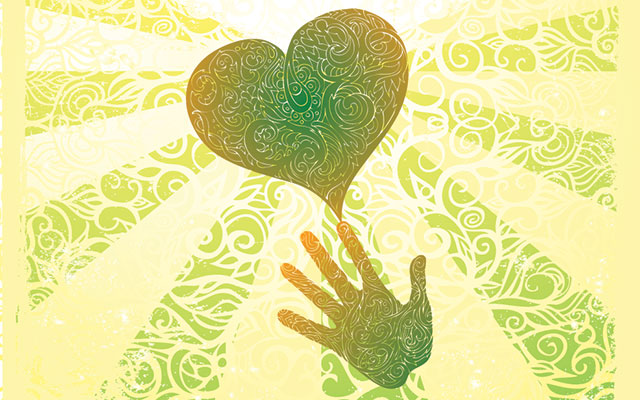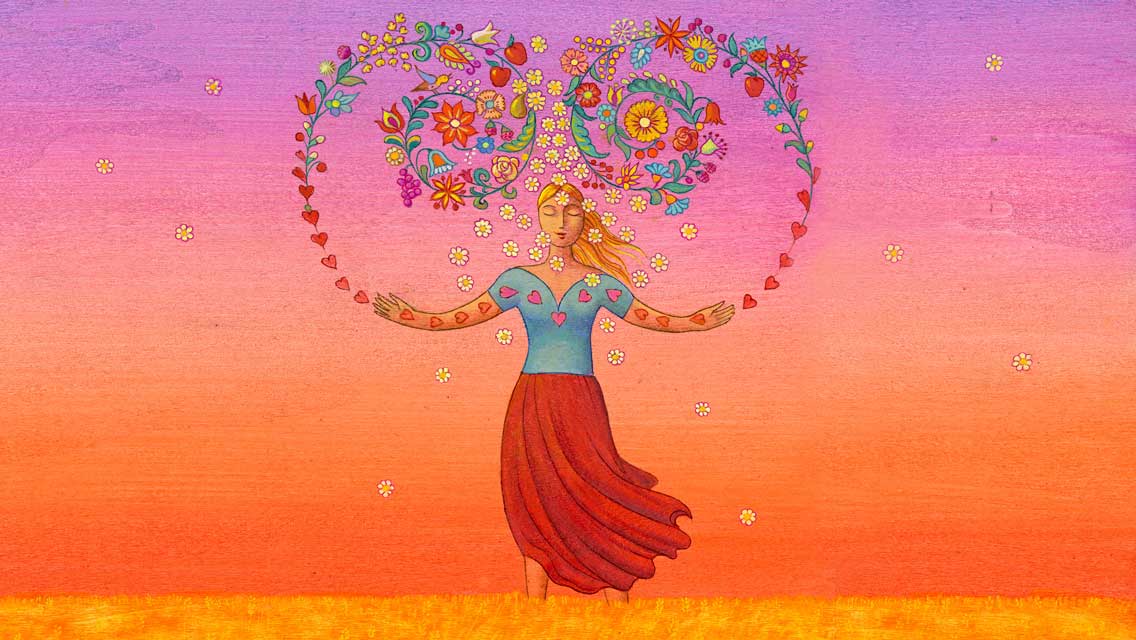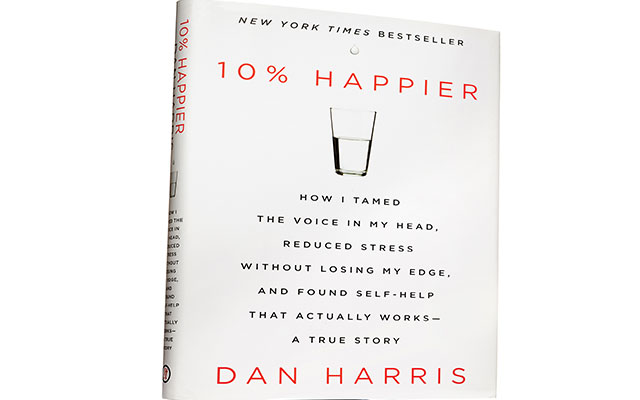The founder of Stanford University’s Center for Compassion and Altruism Research Education (CCARE), James R. Doty, MD, a professor of neurosurgery at Stanford, discusses how compassion and social connection have a powerful effect on our health, happiness, and wellbeing.
Experience Life | How do you define compassion, and why compassion research important?
Dr. James Doty | I think compassion is the appreciation, acknowledgment, or recognition or another’s suffering and, as a result, feeling a desire to alleviate that suffering. That doesn’t necessarily mean you have the ability to — it’s just that you wish that person’s suffering to be alleviated, and if you could, you’d do so.
Now that there’s interest in the scientific community to understand compassion — both in regard to how these types of behaviors effect the brain itself, and how as a result your peripheral physiology is effected — it gives support to the integration of programs that promote compassion in a secular environment.
EL | What positive effects do we get from being compassionate?
JD | We know that when somebody is compassionate with intent, it actually increases vagal tone, which is the neuroconnection between your brain, heart, and other organs in your body. When that happens, it downregulates your sympathetic nervous system and upregulates your parasympathetic nervous system.
Your sympathetic nervous system is that which is associated with the fight-or-flight mechanism, the fear response, and the disgust response. And when you’re in that mode, you shut down, you’re not as thoughtful or creative. It decreases your ability in your frontal lobes to execute executive control. It also increases your heart rate, makes you anxious, depresses your immune system and all sorts of deleterious effects.
Conversely, if you’re able to increase your vagal tone and stimulate your parasympathetic nervous system, it does just the opposite. You’re relaxed, you’re open, your blood pressure goes down, your heart rate goes down, and you’re much more creative and open to new ideas. You look at the world in a completely different way. And the ultimate effect of that is that you are healthier and happier.
The Dalai Lama says being compassionate is one of the only acts in which it’s good to be selfish — you’re being selfish when you’re compassionate, because you’re benefitting.
EL | When we show compassion, how are others impacted?
JD | On both sides, there’s a profound effect. When we see others act compassionately, it actually stimulates those feelings in observers and has a ripple effect on them being more compassionate and giving them a sense of wellbeing.
As an example, you can think of instances where there’s a group of people sitting in a room, and an individual walks in who is compassionate and kind and open, and this promotes dialog, it promotes trust, it promotes a comfortable feeling, it promotes people communicating. Then you know the other type of person. They walk into the room, suddenly people become anxious and fearful, and they don’t communicate. It changes everything.
EL | Are we biologically predisposed to be compassionate beings?
JD | As a species, we have theory of mind where we are able to appreciate that people have thoughts independent of us, we have abstract thinking and complex language. This necessitated an enlargement in our cortex, which ultimately created a requirement that our offspring are cared for a decade and a half to two before they can independently function in what was — and some would say still is — a harsh environment.
Because of that reality, the caregiver had to be connected to the offspring by very, very strong bonds or the offspring would not survive and the species would not survive. As a result, integrated within our DNA are these very powerful mechanisms that make us care, that make us respond to suffering of another, and actually have a desire to intervene.
That evolved into the next step in the evolution of our species, which was from the nuclear family to the hunter-gatherer tribes of 10 to 50. And again, in this harsh environment, if we’re not able to recognize that another is suffering, it potentially put the entire group at risk, because if someone is suffering, that means they’re not focused on doing their job. If their job is to be involved in the security of the tribe, then it puts the entire tribe at risk. So, it reemphasized the critical importance of connection, caring, and responding to suffering that is innately human.
EL | Is it more difficult to be compassionate in our modern world, where we don’t need to rely on a “tribe” for survival?
JD | The reality is that our DNA has not significantly changed from two hundred thousand years ago — we’re basically wired the same as when we lived on the savannah in Africa. We are attuned to patterns or noises or movements. The problem is, in modern society, you hear loud noises all the time, there’s movement everywhere, and it’s constantly keeping you in a state of distraction.
When you have these distractions, it puts many people in low-level angst, increasing their sympathetic tone. Thereby, they chronically release cortisol, epinephrine, and norepinephrine at low levels. When it happens chronically, these have really, really bad effects on your peripheral vascular system, on your heart, and ultimately on your health. As a result, the occurrence of disease, the severity of disease, the duration of disease are all increased.
The other problem is that, in prior times, most people lived in a community; they did not travel far; their parents, grandparents, and children oftentimes lived in walking distance. We know that as a species we are made to connect with other people. That’s where we feel safe, that’s where we feel a sense of trust, that’s where we feel warmth. When that is removed, it has horrible effects.
In modern society, where does that type of community exist? There’s almost none. Because you grow up, go to college, and move to take a job elsewhere. Your siblings are dispersed throughout the world or United States, your aunts and uncles are not in proximity to you or your parents, and it goes on and on.
Some people come to a place that is in and of itself stressful. A high-powered job, for example, creates stress. Then — when you have no outlet where you feel social connection, trust, and warmth — it further exacerbates this stimulation of sympathetic tone and makes the situation worse. It’s difficult, and is actually a source of a lot of problems.
We have an epidemic of isolation and loneliness. One quarter of Americans say that when they suffer or are in pain, they have no one to talk to. Imagine. This is what we need. This is what makes us feel our best: When we’re suffering, to be embraced and cared for by someone who we know unconditionally loves us. When you have that, the world’s not a dark place. You know that it’s going to be okay, because you have people who love you, and who will watch out for you and care for you, no matter what.
EL | Is it possible to become more compassionate?
JD | There is clearly very strong evidence that certain types of mental practice or meditation can have a profound effect on your ability to be compassionate.
Remember, like happiness, there is enough evidence to say that compassion is has a significant genetic component. And probably, like happiness, a significant part is purely genetic and another is environmental — the nurture side. That means that you can adjust your thermostat.
Learning these types of techniques and responses isn’t going to happen overnight. But if you take the time to do it, you get all these immense benefits. You’re calmer, people around you feel more comfortable, and people engage with you in a different way. Even in terms of regular things that happen in your life, if you have this intent with you at all times, it changes the whole course of events.
You can see two people walk out into the rain. One person says, “Thank god we have rain. That means the crops are going to grow, it means that there’s going to be nourishment. We needed this. The warmth of the rain on my face feels incredible, it makes me feel alive. I’m so thankful.” Then another person walks out and goes, “Ah, dammit, this rain got my suit wet, it’s going to take longer to drive home, my whole day is ruined. My day started out bad and this tops it off.”
When you look at the world in a different way. When you look at the world through the lens of compassion and being kind and not being emotionally reactive, it creates an amazing gift.



This Post Has 0 Comments